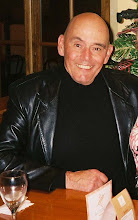In Ken Burns’ landmark documentary The Civil War, the first episode opened with writer Shelby Foote saying, “You can’t understand America without understanding the Civil War and the role race has played throughout our history.” In watching Barack Obama’s acceptance speech in Denver last night, my mind drifted back to my childhood when I first experienced the role race plays in our nation’s history.
In the summer of my fifth year, when my sister was a new-born infant, my parents set out to buy their first home. Every Sunday, Janice was left with Papa and Grandma while mother, dad and I climbed into our recently-purchased, green, two-door Nash coupe and drove around Milwaukee, Wisconsin, going from one open house to another.
At the time, Milwaukee was a prosperous city, growing in size as the industrial might of Allis-Chalmers and Johnson Motors and Harley-Davidson shifted back to consumer production, drawing tens of thousands of people from Midwestern farms and the rural South to well-paying jobs in the endless factories sprouting up and dotting the city’s south side.
As a result, the face of Milwaukee was changing.
Once dominated by the stern, round, white faces of Germans and Poles, the city was drawing a steady stream of southern black faces – people who were called “Negro’s” back then – that came from dirt poor counties of Alabama and Mississippi and Kentucky where they had no chance for a life, moving to a city where they could find a real job, not have to fear every sound in the night because lynching was still a law enforcement tool down South, and where they could send their kids to a decent school.
A combination of the country’s post-war, Eisenhower prosperity coupled with the huge number of new families being formed and new people moving into the city meant sub-divisions were sprouting up everywhere, like tulips in the warm spring sun. So, we spent Sunday after Sunday going from one new suburb to another. Some developments mother dismissed because the houses were “cracker boxes,” whatever that meant; some were too expensive, even with dad’s GI mortgage requiring only 5% down and a 2% interest rate waiting to be signed. Some had tiny kitchens; some had only one bathroom; others just two bedrooms.
But on one such Sunday outing, we found the perfect house: Four bedrooms, a big yard to play in and a basement for when it rained, a new school with a huge playground only three blocks away, and a Halen’s – the local grocery chain – within walking distance. I was very excited.
Suddenly, mother gave the real estate agent a curt “thank you” and hustled dad and me out to the car. As we drove away, I stood up to lean on the back of the front seat with its sticky, green, nylon upholstery to ask why we weren’t going to buy that neat house. Mother’s answer gave me my first introduction to the real world.
“Because the man said they won’t let Negroes buy houses here,” she explained, swivelling around to look at me. “That’s not right. Everyone should be able to live wherever they want.”
I had no idea what a radical family I’d been born into five years earlier, or what a political activist my mother was en route to becoming. Yet a short 10 years later, I wasn’t surprised when she flew to Washington to be part of the march and hear Dr. King’s speech. And 10 years after that, when she and father ended up on one of Nixon’s “enemies lists,” not only was I not surprised but took it as a complement.
As Obama spoke at Mile High Stadium, tears welled up in my eyes as I remembered that Sunday afternoon and compared it to what was happening last night. When I was a child, there were still lynchings in the south yet also neighbourhoods in Milwaukee, a northern city, where African-Americans were not allowed to live. But I lived long enough to see an African-American accept the Democratic Party’s nomination to be President of the United States – not because of his color but despite it.
The skinny black kid with big ears and funny name – how Obama described himself four years ago when he keynoted the party’s convention – is one step away from becoming the leader of the free world. And America took one huge step towards putting its racist past behind it. The most remarkable thing is that he won because of his ideas.
We are a better people this morning that we were yesterday. And if Obama wins, we will be a better, safer and prouder nation when we go to sleep the night of Jan. 20, 2009.
Tom Degan
1958-2023
To all Tom’s faithful readers of the Rant, we are sad to announce that he
passed away on December 7th, 2023. Thank you so much for th...


No comments:
Post a Comment